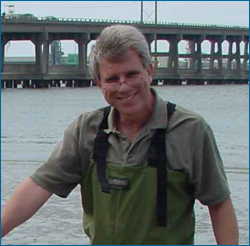The work of David O. Conover
by the Understanding Evolution team

Though fishermen will always tell tall tales about the big one that got away, more and more evidence suggests that the “big ones” simply don’t exist anymore — and Dr. David O. Conover’s work suggests why: many fish are evolving smaller body sizes. David, a Professor and Dean and Director of the Marine Science Research Center at Stony Brook University is a fisheries biologist with an evolutionary bent who likes to tackle practical problems — a goal that is, apparently, a family tradition. As he says, “I always admired my father because he did research that helped local farmers solve problems with diseases that their plants were experiencing…So science serving society was something that I grew up with.”
David, however, has turned his attention towards our lakes, streams, and oceans and the impact of our fishing practices on fish evolution. Think evolution is something that happened long ago when T. rex walked the Earth? Well, think again. David’s work demonstrates that fish can evolve remarkably rapidly and that humans may be causing major evolutionary changes in the fish species that are most important to us economically.
In this research profile, we will explore these key questions:
- How does artificial selection act to change populations?
- How are humans reshaping the course of fish evolution?
- How are experiments used in testing evolutionary hypotheses?
- What are correlated traits and how are they related to artificial selection?
- How can an understanding of evolution help us better manage fisheries?
Learn more about fishing and hunting on the Understanding Global Change site.
Get tips for using research profiles, like this one, with your students.
